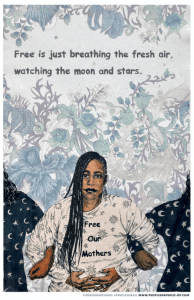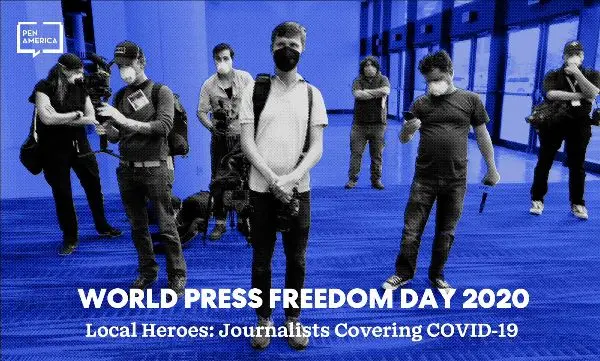Temperature Check, Vol. Five: The Women’s Issue feat. Elizabeth Hawes and Keri Blakinger

A new rapid response series from PEN America’s Prison and Justice Writing Program, featuring original creative reportage by incarcerated writers, accompanied by podcast interviews with criminal justice reform experts on the pandemic’s impact in United States’ prisons.
To receive this series straight to your inbox, sign up here.
Volume 5.0 Table of Contents
- Introduction to Temperature Check
- Dispatches from Inside: Prose by Elizabeth Hawes
- Podcast: The Marshall Project journalist Keri Blakinger
- Featured Work From the PEN America Prison & Justice Community
- Advocacy, Action and Resource Round-Up
Introduction To Volume 5.0:
The Women’s Issue
Dear Readers,
I want to open today’s Temperature Check with a quote from PEN America Writing For Justice Fellow Vivian Nixon’s recent The Sacramento Bee op-ed:
Mass incarceration is dangerous and literally sickening to the people it touches. It undermines the health and safety of all of society, not just some particular undeserving few.
Leaping from Vivian’s clear message, our fifth issue focuses the lens on women, and publishing just on the heels of Mother’s Day offers a poignant time to frame the dire conditions of our nation’s incarcerated mothers and daughters.
Nearly 10 percent of the over 2 million people incarcerated in the United States are women, a population that’s grown at twice the rate of men’s incarceration since 1980. Of those numbers, 80 percent of women in jails are mothers, and more than 60 percent of women in state prisons have a child under the age or 18.
 As of April 24th, there have been 9,437 cases of COVID-19 reported among incarcerated people. Although there are no gender-specific stats available, we know that on Tuesday, April 28, Andrea Circle Bear was the first woman incarcerated in a federal facility to die of the coronavirus after spending weeks on a ventilator. She passed away giving birth to a son.
As of April 24th, there have been 9,437 cases of COVID-19 reported among incarcerated people. Although there are no gender-specific stats available, we know that on Tuesday, April 28, Andrea Circle Bear was the first woman incarcerated in a federal facility to die of the coronavirus after spending weeks on a ventilator. She passed away giving birth to a son.
As we raised funds for Black Mama’s Bailout with our CURA Magazine launch last week, and support Essie Justice Group’s call for their own bailout efforts, we meditated on how COVID-19 is exposing the particularly fraught conditions of Black women in spaces of incarceration across the United States, and how due to historical racial inequity in the healthcare system, Black women are already at a disadvantage.
Our PEN America Writing For Justice Fellow, Justine van der Leun reported in The New Republic on Darlene Lulu Benson-Sealy, the first woman—a Black woman—to pass away from coronavirus at New York State’s Bedford Hills Correctional Facility. The article raises important questions that permeate Justine’s larger body of work, examining the structural, historic, cultural, and legal forces behind the criminalization of women’s defense and survival from abuse.
It felt important to uplift these facts and efforts, as this issue of Temperature Check features the contributions of two justice-involved white women, both of whom are powerful advocates for women of color.
Multi-PEN America Prison Writing award-winning Elizabeth Hawes—this year alone, Elizabeth received awards in two categories—and the outspoken Keri Blakinger, the first formerly incarcerated reporter at The Marshall Project, offer two moving portraits of life in a women’s prison during the pandemic. Keri bravely shares about feeling re-traumatized during this moment, and how she’s persisting, while Elizabeth offers a timely reminder that through waves of loss, it is okay to cry, to ask, am I okay? And to respond, No, I am not.
I hope these works move you to action, and I urge you to spend time in the advocacy section below this week. We’d love you to share the action you took, and invite others to follow your leadership.
In solidarity,
The PEN America Prison and Justice Writing Team
Caits Meissner, Program Director
Robert Pollock, Program Manager
Kate Cammell, Spring 2020 Program Intern
Brookie McIlvaine, Spring 2020 Program Intern
Dispatches from Inside
 For Temperature Check, we’re commissioning currently incarcerated writers to share the direct impact of COVID-19 in prison through creative reportage.
For Temperature Check, we’re commissioning currently incarcerated writers to share the direct impact of COVID-19 in prison through creative reportage.
Our fifth dispatch comes from Elizabeth Hawes, recipient of six national PEN America Prison Writing Awards prizes in poetry, memoir and drama, as well as two Minnesota Broadsides. In 2017, she was chosen by Minnesota Public Radio and the Penumbra Theatre as one of twelve Minnesota writers to contribute to the discussion of My America and MPR’s “Let’s Talk,” and was also nominated through the PEN America program to submit a poem to be part of the Smithsonian’s “Object: My America.”
Her pieces have been read at Hamling University readings (2015–2018), and published in the Stillwater Journal (2015–2019). She has been a finalist for PEN America’s Writing for Justice Fellowship, and featured in their PEN Ten interview series. Her writing was co-published in the Asian American Writer’s Workshop’s A World Without Cages and American Theatre Magazine.
Minding the Gap
By Elizabeth Hawes
On Monday, when I call my husband Dan, he tells me that Nan sent him an email to say she is thinking of me and to tell us about her dad.
I immediately cry, ready to hear Milton died. And he didn’t. He is fine and Nan is calling him every day. After we hang up, I think how quick I am to assume bad news. How quickly I cried and thought Milton died.
And I realize I’m scared. Me, the voice of reason in the room. Two days ago my next door neighbor asks me if I think this is the end of times. I calmly tell her general stats of the Black Plague, and then give current numbers of the Coronavirus. I try to reassure her that while 2-3% of those infected could die, most people will not. We just need to sit tight for a while. Stay calm. Wash our hands.
Minnesota’s Lt. Governor Peggy Flanagan’s brother died. He is the first in our state to die of the virus. A woman in our unit made Ms. Flanagan a nice card that we are all signing.
Throughout the week I’ve heard people on television speak with frustration about isolation and its limitations; about not being able to do what they would like to do; about uncertainty and anxiety and fear and shortages and stress; about not being able to care for those they love. Everything that sums up a prisoner’s everyday life.
It’s Wednesday and the Unit Sergeant just called me down to the day space with my friends, Kelli and Wendy. We all look after an elderly woman who lives in our wing. We were told we can no longer do so. No more contact—she was officially quarantined. She had been self-quarantining for the last few weeks. A nurse stopped in to see her today. Our friend has a cough. She was not diagnosed with the flu. She is 86.
I cry. She is already isolated. There is no one here who is her age. She had a stroke two years ago and lives a solitary existence as it is. Normally we bring her trays from the lunchroom so she doesn’t have to walk over with her walker and sit in a noisy, congested environment. Every morning, Kelli disinfects her room and cleans it, and syncs our friend’s tablet so she is able to email her family through JPay. Wendy talks with her and makes her snacks. I ask her about stories from her past. Kelli helps her evacuate during fire drills and Wendy helps her with laundry. We all used to put puzzles together in the day space before this pandemic brought a partial lockdown to the prison.
Tonight we are writing to her family and friends on the outside so they can send cards. I’d want to know if someone I cared about wasn’t well. The prison doesn’t notify relatives of a person’s health unless they are close to death.
The visiting room closed down on March 11. All volunteer-led activities have been cancelled since March 18. No church or other religious services, no gym, no groups. We have limited work and class schedules. We are given an hour outside our rooms every day. We are allowed to do our laundry once every five days. We have limited phone use. At first we could only call out every other day, now we can use the phones daily but only at certain times. We now eat in small groups: two at a table in the lunchroom instead of the normal 8-10. The gym is now set up with tables so our meals can be served faster. Wherever we are, we sit four feet apart.
People’s main concern is for their families, especially their children and parents. There is worry about not getting to call home and worry about running out of money because of drastically cut work hours.
There is more anxiety and depression than there was last week. I think about how my mom is 83. How my crying over Milton and my friend across the hall tells me I am more stressed than I thought.
Am I okay? No, I’m not.
Moved by what you read? Respond to Elizabeth’s work by writing to her on Jpay or at Elizabeth Hawes, #231-469 1010 West 6th Ave Shakopee, MN 55379.
Works of Justice Podcast Interview: The Marshall Project’s Keri Blakinger
 To understand the particular challenges faced by incarcerated women during COVID 19—of whom nearly 80 percent are mothers, to name one glaring example—and to learn about how COVID-19 is amplifying them, we called Keri Blakinger, the first formerly incarcerated staff writer at The Marshall Project.
To understand the particular challenges faced by incarcerated women during COVID 19—of whom nearly 80 percent are mothers, to name one glaring example—and to learn about how COVID-19 is amplifying them, we called Keri Blakinger, the first formerly incarcerated staff writer at The Marshall Project.
Keri also reports for the Houston Chronicle and co-hosts their podcast Behind the Walls about criminal justice in Texas. Keri’s thorough and thoughtful reporting has led to prison reforms, including a state-level effort to get 3-D printed dentures to incarcerated communities. Read Keri’s interview in PEN America’s World Press Freedom Day 2020 effort, described below.
Listen to the half hour-long conversation on our Works of Justice podcast:
Click here to access the transcript or listen on Apple Podcasts Spotify Google Play
Featured Work From the PEN America Prison and Justice Community on COVID-19

We’re incredibly proud that two of our Writing For Justice Fellows (Justine van der Leun and Arthur Longworth), and two Prison Writing Award winners who serve as editors on prison newspaper staffs (John Corley, The Angolite and Jeffrey Young, The Prison Mirror), are featured with brief and compelling interviews in World Press Freedom Day 2020.
This impressive effort from PEN America’s Membership and National Outreach team celebrates excellent local reporting and recognizes the sacrifices journalists make to meet this vital mandate—even as their news outlets face mounting financial challenges and are forced to cut back on staff and distribution.
Last week, we announced our 2020 Prison Writing Award winners! Save the date for June 11, 2020 at 5pm EDT, when PEN America, in partnership with Haymarket Books, will present a live podcast from the Prison Writing Awards Archives.
Read the mass incarceration-themed issue of Fordham University’s CURA magazine, a publication in partnership with PEN America, featuring a stunning and moving array work from our Prison Writing award winners and Writing For Justice Fellows.
Then, check out TheaterLab’s Voices Inside series, featuring impressive and capable actors staging the work of the incarcerated writers featured in CURA.
Justice advocates are alert to increases in rates of domestic violence during lockdown. To raise awareness, our program has coordinated with Rattlestick Theater for a virtual salon on domestic violence with artist/activist Raquel Almazan, relational psychotherapist Lia Avellino, and Executive Director of the NYC Domestic Violence Task Force Bea Hanson to discuss the increase of domestic violence during this time of COVID. Our partner for the online Remote Arts Series on Human Resilience and CJ Reform, the Institute for Innovation in Prosecution at John Jay, has NYC-based resources and an informative panel on domestic violence.
As mentioned in the introduction, Writing For Justice Fellow Vivian Nixon’s op-ed, “COVID-19 highlights the need to protect health for all by ending mass incarceration,” was published in The Sacramento Bee.
Justine van der Leun’s latest, “Death of a Survivor,” honors the story of Darlene “Lulu” Benson-Seay, the first COVID-19 victim at Bedford Hills Correctional Facility, in The New Republic.
Advocacy, Action and Resource Round-Up
The DU Prison Arts Initiative recently launched The Inside Report, a news publication whose mission is to provide an intellectually challenging forum for information, entertainment and inspiration, written by and for the people who live and work within the Colorado Department of Corrections. Check out their first issue here.
Submit your work to The Collection, a new online journal from the Open Doors Reality Poets, a virtual showcase featuring dope creative work that uplifts the voices of gun violence survivors, people with spinal cord injuries and other disabilities and their allies. Learn more here.
Here is another helpful news aggregate via The Marshall Project that collects information on women who are incarcerated.
How can we cope with isolation during the coronavirus? Formerly incarcerated women give advice in the Philadelphia Inquirer via The People’s Paper Co-Op. Additionally, the Co-Op worked with artists across the United States to transform their criminal records, poetry, and photographs into a powerful set of art pieces, which have raised $30,000 in two weeks to help bail out Black mothers and caregivers on Mother’s Day. You can purchase art—100 percent of proceeds go to freeing women, here.
Essie Justice Group needs your help to #freeblackmamas. Right now, there’s a mama sitting in a jail cell with two young children waiting to be reunited with her at home. She has been held pretrial for over a year and denied proper medical care for her medical condition. Essie is ready to bail her out, but they need your help. Her bail is $200,000. With our NBO partners, we’ve raised half of what she needs. Donate now to help them reach their goal.
View links to last week’s advocacy efforts, including those pertaining to incarcerated youth, Die Jim Crow record label’s PPE fundraiser, and a free intellectual property rights guide for people who work with incarcerated creators by clicking here.






